Cancellara aims for home wins at cycling worlds
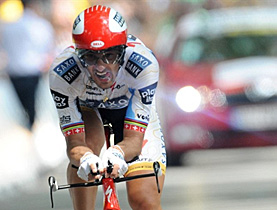
Switzerland's Fabian Cancellara will face a number of uphill battles when he races the world's top road cyclists at the world championships in Mendrisio this week.
The two-time world time trial champion and defending Olympic gold medallist in the same discipline is set to test his legs on the mountains of Ticino, his country’s Italian-speaking region.
The 28-year-old Saxo Bank rider’s chances are good in Thursday’s 49.8-kilometre individual time trial, and he has proven he can train his focus on more than one event.
He finished third in the Beijing Olympics road race last year and struck gold four days later in the time trial. The effort left him too exhausted to race the worlds.
“I’m impatient for these races to begin,” Cancellara said on Tuesday. “For me, it’s one time in my life that I have the chance to race to be the world champion at home.”
It is the first time in 13 years that the championships have been held in Switzerland.
Cancellera will face a challenge in Sunday’s 262.2-kilometre race, which will punish cyclists over 19 laps and more than 4,600 vertical metres of climbing.
“In my opinion, the course is too difficult for Cancellara,” said Antonio Ferretti, a former professional cyclist and a cycling journalist. “The climbing distance is too high. Cancellara is a heavy cyclist but his impressive muscle is poorly adapted to climbing.”
“But he is convinced of his strength and as prepared as ever for the worlds. In addition, he has an extraordinary mental strength; when he sets a goal, he almost never misses. We can expect a big race from him.”
Strength and strategy
Joseph Herzog, the head of the Swiss Association of Racing Cyclists, agrees.
“On Thursday, he will attempt to reclaim his two world titles, which he gave away last year,” Herzog told swissinfo.ch. Cancellara won the time trial in 2006 and 2007. Germany’s Bert Grabsch won last year.
“The chances, given his successes in relatively short races, I think are very good,” Herzog added. “I have not seen the course in Mendrisio but [Sunday] depends on the mountain.”
That race requires both endurance and strategy, as cyclists from each of the world’s top teams will work together to ensure one of their men ends up on the podium. In spite of Cancellara’s strengths, the Swiss team’s relatively small size will work against him.
“It’s a maximum of five cyclists, including Cancellara. And in a field with 200 starting the race, it is difficult,” said Herzog of the support the star rider can expect. “The Swiss team lacks the depth and breadth to keep cyclists in different parts of the pack, as well as to keep up with and rein in breakaway groups.
“If we look at the Italians, for example, they don’t care who is the world champion. For them, it’s important that in each group there is an Italian. When we look at this realistically, Cancellara’s chances are small.”
Feretti is looking to Italy’s Damiano Cunego, Norway’s Edvald Boasson and Belgium’s Philippe Gilbert but finds it hard to make a prediction “because cycling is going through a dark period. Riders who had the ideal characteristics have been disqualified.”
Davide Rebellin and Danilo De Luca, both of Italy, are out. It emerged in April that Rebellin had been caught doping during the 2008 Summer Olympics. De Luca was banned in July after cheating in the 2009 Giro d’Italia.
Both used a new class of erythropoietin (EPO) designer drugs. Spanish and Portuguese riders, and another Italian, have also been provisionally suspended by Union Cycliste Internationale (UCI), the sport’s governing body.
Sport’s sore spot
Feretti, the Ticinese rider, says: “In cycling, you confront yourself. You submit to your limits. And then it’s like a travel novel. It is a sport that puts you in connection with the landscape and the environment.”
Both he and Herzog however maintain a pessimistic outlook on the sport: limits are artificially enhanced, they argue, and success can be designed in the doping lab before it is determined in the peloton.
“Unfortunately, it is a practice that persists to win the world championships and or a major stage race, and it brings a lot of fame and money. Today, some doctors are able to really make a difference. The rider who goes to the good doctor prevails,” Feretti said.
“Look, this is my very personal opinion but I only trust the beginners and the juniors. If you look at the Under-23 category, you have to say, they resort to methods to get professional contracts,” said Herzog.
“And when you look at the top levels, the people that fall into that category, they are left alone. I believe that the UCI turns a blind eye and that no consequences are levelled if somebody is caught.”
The UCI, which calls the fight against doping a “main priority” vehemently denies the allegation. In a telephone conversation with swissinfo.ch on Monday, an exasperated spokesman acknowledged the sport faces “serious problems” but noted the millions UCI spends annually to combat drug cheats, as well as its random spot checks.
In 2006, it commissioned an independent audit that it will use to form policy. In its 2008 anti-doping programme, the UCI conducted 12 blood tests and collected four urine samples from each of its top riders. Cheats receive a two-year suspension for the first offense, followed by a life ban for a second.
The UCI’s rules are not in line with 2009 standards established by the World anti-Doping Agency, according to documents issued by Montreal-based body.
Spokesman Enrico Carpani dismissed accusations that the UCI is lax on cheating as so baseless they did not merit a response.
Justin Häne, swissinfo.ch (with input from Françoise Gehring)
David Howman, director general of the World anti-Doping Agency (Wada), says the UCI anti-doping programme “has improved a great deal”.
But he cautions that quantity – the UCI does a lot of testing – does not necessarily translate into quality.
“What we are doing now is looking more generally whether quantity of testing is what we really need. It’s probably more quality,” Howman told swissinfo.ch.
“What we don’t know yet, and this is something we’re still waiting to hear from the UCI on, is how they’re using the athlete passport to show that doping is occurring.”
Howman says the UCI rules are in line with Wada’s.
“They are moving in a satisfactory direction,” he said. Howman says analysing the quality of a testing regimen is “more subjective”.
UCI spokesman Enrico Carpani said: “The relationship between the UCI and Wada is excellent.”
The UCI is suing Wada over comments made by its former head, Dick Pound.
Howman says that the relationship “at a high level, is quite difficult.”
Individual:
1. Alberto Contador (ESP)
2. Alejandro Valverde (ESp)
3, Andy Schleck (LUX)
4. Cadel Evans (AUS)
5. Edvald Boasson (NOR)
6. Roman Kreuyiger (CZE)
7. Mark Cavendish (GBR)
8. Samuel Sanchez (ESP)
9. Allan Davis (AUS)
10. Damiano Cunego (ITA)
23. Fabian Cancellara (SUI)
Country:
1. Spain
2. Italy
3. Australia
4. Germany
5. Russia
6. Belgium
7. Luxembourg
9. Norway
9. United States
10. Britain
15. Switzerland

In compliance with the JTI standards
More: SWI swissinfo.ch certified by the Journalism Trust Initiative
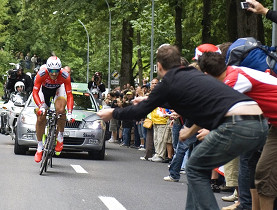
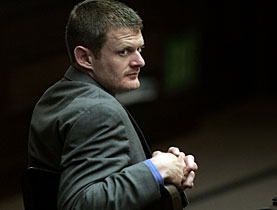
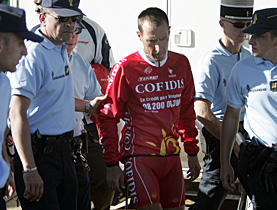
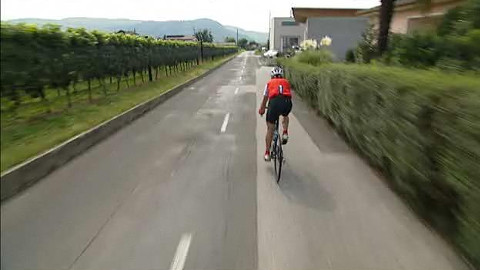
You can find an overview of ongoing debates with our journalists here. Please join us!
If you want to start a conversation about a topic raised in this article or want to report factual errors, email us at english@swissinfo.ch.